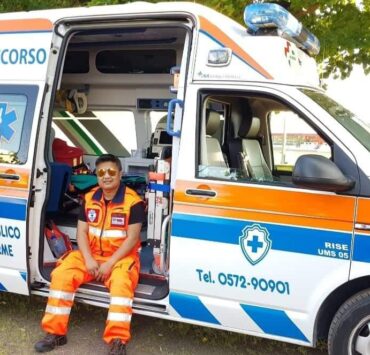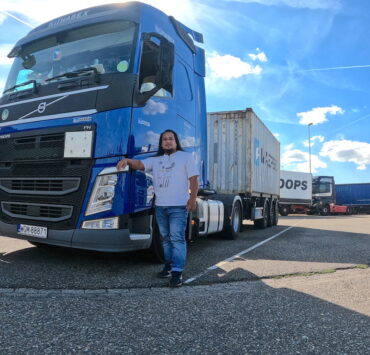The Filipino Expat Magazine talks to three kababayans whose jobs put them behind the wheel and take them to uncertain roads. Roads where they defy exhaustion, danger and even nature’s wrath. Roads where they learn to embrace the adventure, the excitement, the unexpected. In this article, Gary Belarmino a Filipino truck driver in Saudi Arabia, shares how he braves the dangers of the desert to provide for his family.
With arms and face fully covered except his eyes, Pinoy driver Gary starts the ignition of his long haul truck to start his first trip of the day. The sweltering heat is already unbearable. After hours of driving, the vehicle suddenly slows down and before Gary can manoeuvre towards the harder part of the ground, it is too late: the truck is bogged in sand.
Using a shovel, he digs out the sand in front of the stuck tires. However, the more Gary digs, the deeper the tires go. Two hours, 40 degrees and still stuck, Gary is getting frustrated. He is in the middle of nowhere with no telephone signal. Much later, somebody passes by and stops to help. After several attempts, the vehicle is successfully hauled out of the sand and off Gary goes to make three more deliveries.
Getting stuck in the sand is nothing new to Gary. He has been in similar risky situations working as a container truck driver for five years now, transporting water, diesel, portable offices or drilling equipment. “This usually happens two or three times a week. Especially if there was a sandstorm the previous night,” explains Gary Belarmino, 37, a Filipino truck driver in Saudi Arabia.
No blankets, no pillows, no food
A native of Bago, Negros Occidental, Gary recalls his journey to Saudi Arabia in a Zoom interview one Sunday afternoon. “I was an assistant soft drink delivery man in the Philippines when I applied as a heavy truck driver in Saudi. I never had any experience driving big trucks but I still gave it a try.” He was hired by a contractor firm for one of Saudi’s major petroleum companies .
“I arrived in 2017. I was very excited. In my mind, I was doing the right thing for my family.”
His excitement would soon vanish after finding themselves housed in what seemed to be a prayer room with nothing but a table inside the company compound in Dammam, a major industrial city 414 km from Riyadh. No blankets, no pillows, no food. They initially thought they were victims of illegal recruiters because of the sorry welcome. The following day, their boss came to see them and gave them food, blankets, pillows and cash advance.
“Saudi law requires truck drivers a maximum working day of nine hours except for emergencies. But in my company, we are required to finish our daily tasks. If we finish early, we can rest early. If it takes longer hours, we have to do it.”
Gary Belarmino, Filipino truck driver, Saudi Arabia
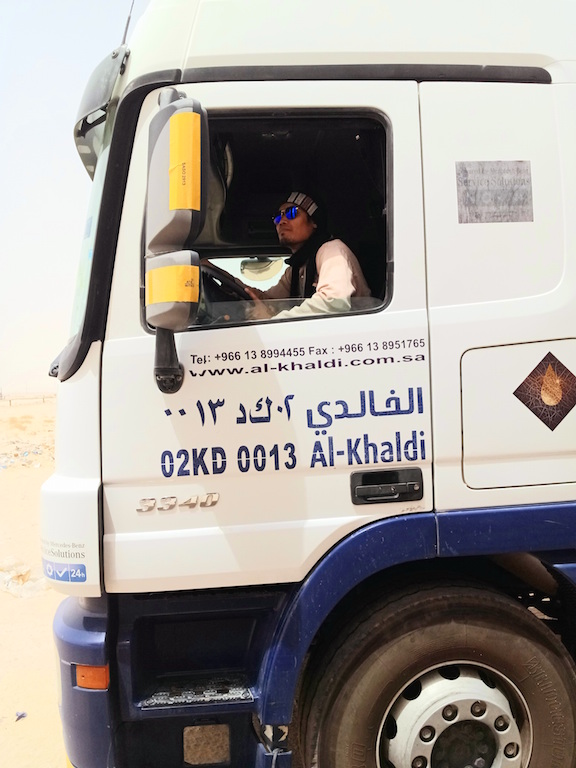
Learning trailer truck driving
As Gary didn’t know how to drive a trailer vehicle, he had to train for a month and pass a series of exams to be granted a license. Right after he got his license, they assigned him his first heavy truck.
All along, Gary thought that his salary would be SAR2,175 with food and accommodation, as promised to him in the Philippines. But to his surprise, his real salary would only be SAR 1,150, food and accommodation included, way below the monthly SAR 4,000, the average salary a truck driver earns in Saudi Arabia. Not wanting to cause complications at work, he didn’t say a word.
In his first months, Gary had to get used to driving long hours in the desert under extreme heat and bouts of homesickness. “Saudi law requires truck drivers a maximum working day of nine hours except for emergencies. But in my company, we are required to finish our daily tasks. If we finish early, we can rest early. If it takes longer hours, we have to do it,” says Gary adding, “I didn’t have problems with the hours. I had a rude supervisor before. He would shout at me, insult me. Later I told him, release me if you don’t like me. After that, he became nice to me.”
Surviving the Saudi Arabian desert
From Dammam, Gary was moved to the nearby city of Haradh where he is currently based. He now earns around SAR 2,700; higher than his initial salary but still below the average salary range. Gary is not complaining. With his earnings, he was able to buy a house and lot for his family. “I feel fortunate that our company pays us on time. There were kababayans who had to seek Tulfo’s help because they weren’t paid for four months.”
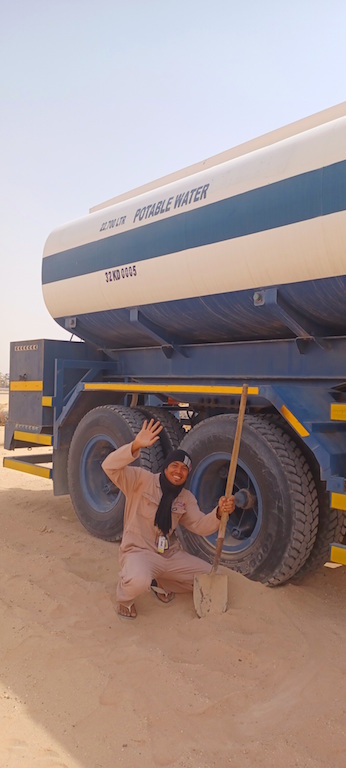
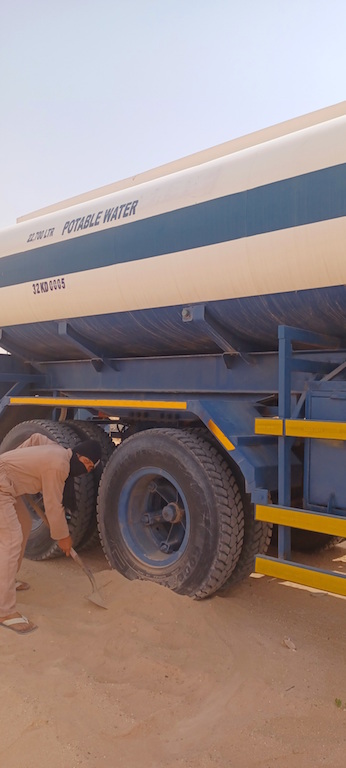
Gary starts work at 6am by cleaning his truck right after breakfast. On an incident-free day, he makes four to five trips depending on the distance of the destination. To keep himself awake while driving, he starts his playlist and sings as loud as he can in the middle of the vast dusty land. He is also an active vlogger (KSA Truckers) on FB documenting his daily drive in the sea of sand. He parks his truck at around 5 pm, logs his day’s travel and gets out of the vehicle to grab dinner. If not too tired, he goes to the gym or plays basketball before hitting the sack at 11. If there is no trip for him to make for the day, he either tinkers with his truck, cleans his room or chats with his wife and his 7-year-old son.
Driving in the desert all these years has made Gary learn how to respect his environment and embrace its unpredictability. After all, the desert is one of the most challenging places to drive. Not to mention, dangerous. The sandy terrain combined with stupefying heat that can reach up to 55 degrees, with no network signal and a lack of assistance, can be life threatening.
“Once, I got stranded in the desert for three days. I got lost, then my vehicle got stuck in the sand. The next day, I had to walk for several kilometres to look for help. When my truck was pulled out and was running, the tires burst I had to wait for rescue to fix the tires. They only came on the third day. While they were fixing my truck, we got caught in a sandstorm.”
Long and dusty desert road
In his vlogs, Gary sings the karaoke, tells jokes and gives tips to drivers planning to work in Saudi Arabia. He is jolly and seems to take things in stride. But behind his humorous quips and jests, he can’t always hide the exhaustion and weariness after a day of navigating an endless sandy terrain, under the punishing heat and some unfortunate incidents.
“Despite everything, coming here was the right decision. I wouldn’t have been able to give my family a comfortable life if I hadn’t come here. Working abroad is good. As long as your family stays intact even if you are away from them. I have friends here who have broken families as a result of being away from each other.“
Gary Belarmino, Filipino truck driver, Saudi Arabia
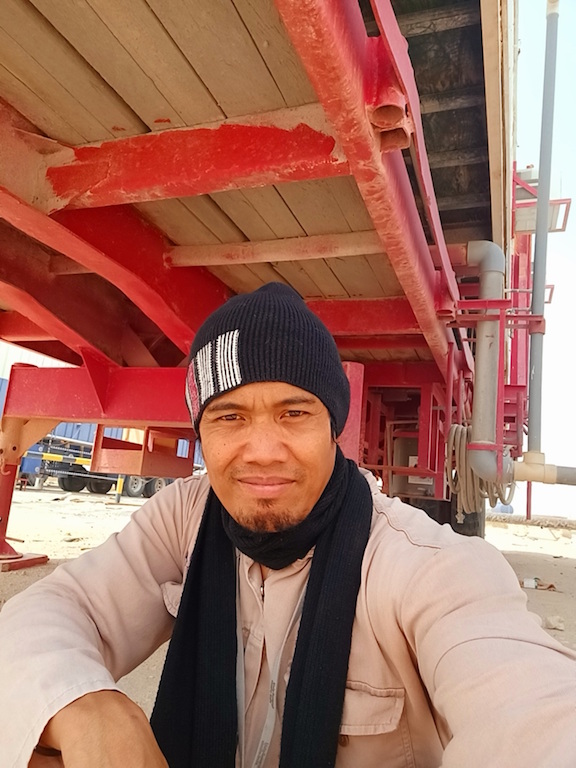
Gary could have changed his mind the moment he discovered the discrepancy in his initial salary. But he didn’t. What options did he have? Returning to delivering soft drinks back home was not going to give his family the comfort they have now. So Gary took the long road, a long dusty one.



